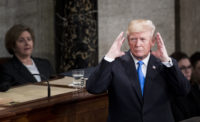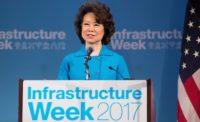More information is coming to light about President Trump’s long-awaited $1-trillion infrastructure proposal.
Transportation Secretary Elaine Chao told a Senate committee on May 17 that Trump “is very impatient” and wants to see a set of “principles” for the plan released around “the latter part of May.”
Testifying before the Environment and Public Works Committee, Chao also said she anticipated that a more detailed legislative proposal would be out in the third quarter of 2017.
The Senate panel has been working with the administration as it develops its plan. Chairman John Barrasso (R-Wyo.) told reporters after the hearing, “The committee is, in a bipartisan way, committed to doing a major infrastructure package. The president is committed to it.”
Barrasso told a Transportation Construction Coalition meeting later that day that “our committee is fully focused on an infrastructure package” and wouldn’t wait for the Trump plan to be unveiled. “We’re going to be working on it now,” he added.
Barrasso said that he and the committee’s top Democrat, Tom Carper (Del.), are discussing a statement of general principles and how we want to proceed.“ He added, “We’re going to work with the White House. But we’re not going to wait.”
House Transportation and Infrastructure Committee Chairman Bill Shuster (R-Pa.) is optimistic about the prospects for legislation. Speaking at the Transportation Construction Coalition gathering, he said, “I believe we will have an infrastructure bill this year.”
Shuster also said that revenue must be found to bolster the financially challenged Highway Trust Fund. He said, “We need the trust fund to stay whole for the next decade or so.” He added that, some time further down the road, a new user-fee system will be necessary, “because at some point…anybody in the transportation business realizes [that] eventually you’ve got to get to some measure of vehicle miles traveled.”
Shuster also said the administration is expected to push for “asset recycling,” in which state governments would get a financial bonus from the national government for leasing infrastructure assets if the localities agree to spend the bonus on infrastructure. "It’s happening all over the world,” he said, pointing particularly to Australia.
Barrasso also said during the hearing that highways and bridges “should be a central component of any final infrastructure bill.” The committee has jurisdiction over highway policy and funding authorization.
Barrasso said that the plan should use the 2015 Fixing America’s Surface Transportation Act’s funding-distribution formulas for parceling out the expected program’s new money.
Sen. Jodi Ernst (R-Iowa) asked Chao about her May 15 comment that the administration’s plan would include direct federal funding for “special projects” that aren’t candidates for private financing.
Chao said that, in the upcoming proposal, “We will not specify any list of projects or anything like that.” Instead, she said, that her comment about the projects was intended as an assurance that “this administration understands the needs of rural America.”
Barrasso and other officials have emphasized that the rural states need direct funds for their infrastructure, because private financing, through such mechanisms as public-private partnerships, don’t work as well in rural areas, compared to urban localities.




Post a comment to this article
Report Abusive Comment